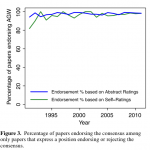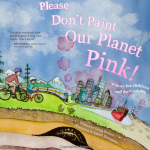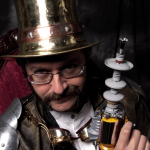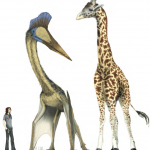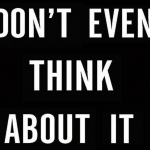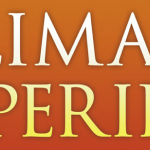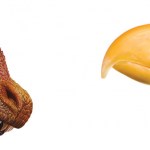book review
There's kind of two theories of the web. The first theory is that it's the best thing ever, the culmination of human civilization, incapable of being anything negative in anyone's lives. Proponents of this theory can't stand it when anyone says anything mean about the web (or usually any technology) in public or especially online.
The other theory is the chicken little theory. According to this theory, the web (and usually any technology) is the reason the world is going to hell in a hand basket. All the bad things in the world are because the web is disrupting science and art and culture.…
Colin Adams's Zombies & Calculus is one of the coolest, funniest, most creative science books I've read in a very long time.
What's interesting about that statement is that we're not talking a non-fiction book here. We're talking a novel. Yes, a novel. Zombies & Calculus is pure fiction. Fortunately. Now I'm a big fan of the Walking Dead tv show and the comics too (though I'm a bit behind on the trade paperback collections) so I"m quite glad it's fiction. Basically, the premise of this novel is, "What if Rick Grimes had been a university math prof instead of a police officer."
The…
Imagine a world where two guys, graduates of the University of Guelph, a mid-sized university in southern Ontario, are able to parlay a series of funny and cool whiteboard-style science explanation YouTube videos into a global science communication empire. Without even "forgetting" to give credit to science illustrators in the process.
Don't imagine too hard, because I think we're almost there.
And what is it about Ontario and humourous science communications anyways? Is it something in the water? At least the most recent incarnation seems to be a little clearer on how things should be done.…
Here's a bunch of graphic novels I've read in the last while that are well worth your time reading and acquiring for your library!
Abadzis, Nick. Laika. New York: First Second, 2007. 208pp. ISBN-13: 978-1596431010
Laika by Nick Abadzis in a fantastic graphic novel recounting the life of the first dog in space, the Russian dog Laika. The book goes into quite a bit of social and political history of the Soviet union in the 1950s, giving a good sense of how totalitarian states sometimes make decisions. We also get an illuminating look into the lives of people around Laika as her fateful one-way…
While I was reading Cory Doctorow's Information Doesn't Want to Be Free: Laws for the Internet Age, I was reminded of a quote of his that I blogged about a few years ago:
The people in Makers experience a world in which technology giveth and taketh away. They live through the fallacy of the record and movie industries: the idea that technology will go just far enough to help them and then stop. That’s totally not what happens. technology joes that far and them keeps on going. It’s a cycle of booms and busts. There are some lovely things about when you’re riding the wave and some scary things…
Dana Nuccitelli is a key communicator in the climate change conversation. He is co-writer with John Abraham at the Climate Consensus - the 97% blog at the Guardian, and has contributed hundreds of entries to John Cook’s famous site SkepticalScience.com. He has measurably helped people to understand climate change science and the nuances of the false debate based over climate manufactured by science deniers.
And, he’s written a book!
Graphic from Cook, Nuccitelli, Et Al 2013 paper quantifying the consensus on climate change. This figure also appears in "Climatology and Pseudoscience"…
We live in a k-cup culture. Focused on the near term but willfully blind to the longer term implications of our daily decisions.
Just before the holidays I was watching the CBC TV show Power and Politics and they were discussing a bunch of "Top 5s" in an end-of year story. You know the type, the Top 5 this's and that's from the previous year, 2014, as well as a couple looking ahead to 2015. With a federal election scheduled in 2015, were the top 5 election issues that Canada that Canadians should keep on their radar in the coming year?
Economy/Jobs
Leadership/Ethics
Energy/Climate Change…
"Please Don't Paint Our Planet Pink!: A Story for Children and their Adults" is a new children's book by Gregg Kleiner about global warming. The idea is simple. Imagine if you could see CO2? In the book, it is imagined to be pink. The imagining takes the form of a quirky father, one imagines him to be an inventor of some sort, coming up with the idea of making goggles that would allow you to see CO2 as a pink gas. This is all described by the man's patient but clearly all suffering son, who eventually dons the prototype goggles and sees for himself.
I read this to Huxley, age 5, and he…
The default mode, politically-speaking, for most scientists seems to be professionally neutral. In other words, most scientists would tend to see their personal political beliefs as more or less completely separate from their work as scientists. Even for politically sensitive topics like climate change, the tendency is to focus on the the best available evidence rather than commenting more directly on the potential policy implications of that evidence. Only by maintaining that politcal neutrality with scientists will be able to maintain their surface veneer of objectivity. If you're too…
Carlos Bueno's new book, Lauren Ipsum: A Story About Computer Science and Other Improbable Things, is another example of how to create a fun and informative books for kids that is both entertaining and engaging. While not without some faults, it does a great job of using character and story to convey serious ideas about computer science in an accessible way.
The premise of the story is that our plucky heroine, Lauren Ipsum, or Laurie, gets lost in the forest after an argument with her parents and somehow finds her way into the mysterious alternate reality Userland. In order to find her way…
For those that don't know, Elizabeth May is the leader of the Green Party of Canada and one of only two Greens in the Canadian Parliament -- and the only one elected as a Green. As such, you would expect that she would be a strong advocate for democracy and the environment, willing to stand up to the current Conservative government of Stephen Harper and tell it like it is.
In her latest book, Who We Are: Reflections on My Life and Canada, she does just that in an entertaining and inspiring amalgamation of memoir and manifesto.
This is an amazing book, sarcastic and hopeful but still witty and…
You know Guy Himber's work. He worked on special effects for Aien 3, Underworld, Independence Day, Edward Scissorhands, I, Robot, lots of other productions. And now, he is playing around with LEGO.
Steampunk Lego by Guy Himber is subtitled "The illustrated researches of various fantastical devices by Dr. Herbert Jabson, with epistles to the Crown, Her Majesty Queen Victoria; A travelogue in 11 chapters." The book itself is all steampunky, in fact heavily steampunky, with brown colors, gears and wheels as background images, and victorian techno-objects decorating a faux photographic album…
Melissa K. Aho and Erika Bennet's anthology The Machiavellian Librarian: Winning Allies, Combating Budget Cuts, and influencing Stakeholders is pretty good for what it is, in some ways better than I expected. It's a guide for maneuvering office politics and advancing your agenda, big and small, with the stakeholders and influencers that matters in your environment. Sadly, this book fails for what it isn't: a book that tackles the issues and trends where librarians really need to advance our agendas and make ourselves key "thought leaders" and "influencers."
The book is a collection of 25…
This one's a bit of a head-scratcher.
Richard Evan Schwartz's Really Big Numbers has a great premise. A kids book that takes some fairly advanced mathematical concepts and presents them in a lively, engaging and understandable format. So far, so good.
Schwartz does a commendable job of taking the concepts surrounding Really Big Numbers and explaining them in a fairly comprehensible format, from simple counting to very high numbers, visual representation of big numbers, conceptual representations when there's no more space for dots on the page, an explanation of powers of 10 all the way to…
Pterosaurs: Natural History, Evolution, Anatomy by Mark P. Witton is a coffee-table size book rich in detail and lavishly illustrated. Witton is a pterosaur expert at the School of Earh and Environmental Sciences at the University of Portsmouth. He is famous for his illustrations and his work in popular media such as the film "Walking With Dinosaurs 3D."
The first pterosaur fossil was found in the late 18th century in the Jurassic Solnhofen Limestones, in Germany, the same excellent preservational environment that would later yield Archaeopteryx. They person who first studied it thought…
There is a new book out on Penguins: Penguins: The Ultimate Guide written and edited by Tui De Roy, Mark Jones, and Julie Cornthwaite.
It is a beautiful coffee table style book full of information. All of the world's species are covered (amazingly there are only 18 of them) and there are more than 400 excellent photos. The book covers penguin science (science about them, not by them). There is also quite a bit about their conservation.
The layout of the book is interesting. The last section of the book, by Julie Cornthwaite includes portraits of each species, and a compendium of…
Climate change is emotional, especially when the effects are disastrous and people's lives are ruined. It is vague, sometimes. For example, bad weather happens and always has happened, so an increase in frequency or severity of bad weather isn't necessarily qualitatively novel, and can be hard to put one's finger on. Although the negative effects of climate change are already here, more serious effects are in our future. So, climate change has a component that is mysterious and hard to relate to, because it is in the future. Climate change is global, but spotty on a given day or in a given…
According to John Berger, author of the newly released book Climate Peril: The Intelligent Reader's Guide to Understanding the Climate Crisis, time is running out. The climate is changing in ways that will bring unwanted results, and we as a species are slow off the mark to do something about it.
Climate Peril: The Intelligent Reader's Guide to Understanding the Climate Crisis begins with a description of the global climate in the not too distant future, 2100. It is of course a guess, perhaps fiction. But Berger's description of the world in 2100 is plausible, and much of it probable. We…
This amusing book, Kanani K. M. Lee and Adam Wallenta's The Incredible Plate Tectonics Comic: The Adventures of Geo, Vol. 1, is brought to us by the same people as the Survive! Inside the Human Body graphic novel series. As a result it has many of the same strengths but it also suffered from some of the weaknesses that the Survive! series was able to avoid.
The strengths are easy to see: engaging and diverse characters, clear and clean artwork, lively narration and great attention to scientific detail outside the main narrative. The weaknesses of the Plate Techtonics version which should…
Flying Dinosaurs: How Fearsome Reptiles Became Birds by science writer John Pickrell is coming out in December. As you know I've written a lot about the bird-dinosaur thing (most recently, this: "Honey I Shrunk the Dinosaurs") so of course this sounded very interesting to me. In a way, Pickrell's book is a missing link, in that he writes a lot about the history of paleontology associated with the discovery, undiscovery, and rediscovery of the early bird record and the dinosaur link.
Birds have rewritten dinosaurs. Not all dinosaurs are directly related to birds, but a large number of them…
